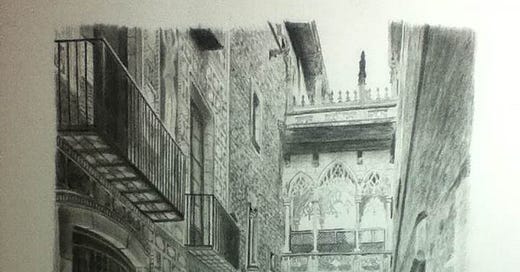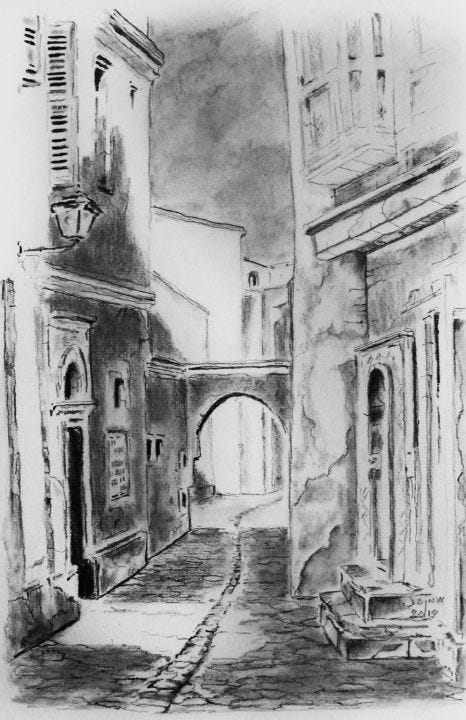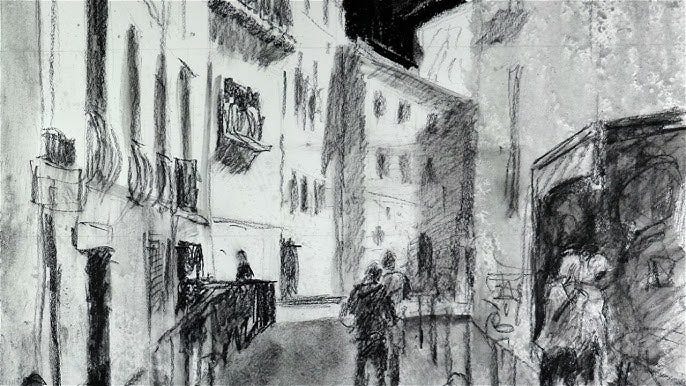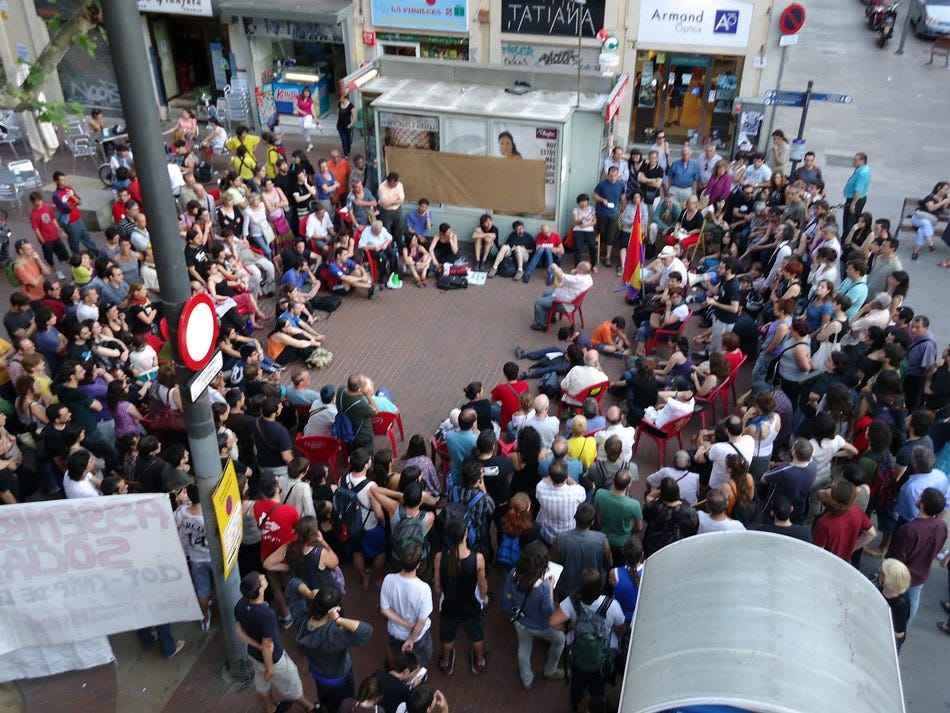Meeting ground is sacred ground, and profane
memory and dream as places of revolutionary encounter
I just awoke from a dream I was back in Barcelona. The city had grown older, instead of growing younger, the way it does in this nightmare of modern urbanism, of gentrification and so-called renewal. It felt alive and dirty, poor but honest, most of all alive, as though the ‘92 Olympics had never happened, as though the mercenary urbanism of the conservatives and socialists and the smart urbanism of the progressives had never happened.
We were pushing through the streets like a pack. One friend was in a wheelchair. A whiff of waking life, pushing a dear one in a wheelchair through a crowded hospital recently… We had come from another labyrinthine building deeper in the city, one I dream myself into sometimes, an archetypal dream warren and also one that holds something of the communal squats we actually created sometimes, all passageways and crawlways and large open collective areas rather than the subdivided, compartmentalized, enclosed apartment blocs that were the contribution of another generation’s modernists, another era’s progressive designers. It’s a dream building that also holds the story of the lesbian elder who survived alone and unnamed all through the dictatorship, and the squatters who found her brokenhearted love letters… have I told you her story yet?
In the dream I had gotten back to the labyrinth-building too late, an estranged friend had left me there a gift of sausage but it had already gone moldy… that’s another story too, of the communal pig slaughters and other traditions we started and lost when friendship withered after conflict was left like a fire untended… but what’s remembered can always come back.
And the narration of dreams like the narration of memory—of our own history—is never linear, so there we were pushing through the crowded city streets like a pack, people of many ages and origins but joined the way a found family is joined, and one in a wheelchair rolling himself or getting a hand with others pushing into the crowd running interference. We moved with the smooth intuition of a practiced affinity group dancing through the surge of a riot. Familiar, a family, and apparently the street was smooth enough despite its decay for the easy passage of a wheelchair. Sometimes our dreams can also smooth out the rough details of waking life and ease our passage.
Finally we arrived at the meeting ground, which was just a wider bend in a street where people had decided to set down chairs, a sacrosanct act in the older culture that neighbors and passersby would give berth to. And I was seated and my friends my found family as well.
Another friend was trying to facilitate—that loose attempt at Mediterranean facilitation rather than the anal-retentive analytic butchering I practice over here, close to the -82nd line of longitude where my sleeping body is berthed. But Mertxe was talking, in a riotous mood and goading that whole third of the circle into abandoned laughter. She’s also a good facilitator and from my young perspective she’s been around a long time, one of a couple friends who shared meetings with Colau when the mayor-to-be was still a part of the housing movement. She was always bent towards professionalism and charity, but still it can feel shocking when the enemy recruits from our own ranks. Nonetheless, it’s not exactly a surprise what happened to the city after eight years of Colau. Her old comrades could see it coming when she and her associates left the squatters and formed their own assembly about ten years before that fateful election. (Earlier and later governments have been more obviously brutal, so she and her associates don’t need to question their motivations or their strategy, and they won’t, as they’ve all grown richer and more respectable.)
Like I was saying, Mertxe is a good facilitator, but when she’s on one God and the Pope couldn’t get that meeting to start on time. Which is fine, because these are sensible people who would never try to get a meeting to fit within an hour. My dreaming body stretched in pleasure, shouting in Catalan and freed from the neurosis of puritanical time.
Someone finally got things in hand and I was first on the stack, which was embarrassing after so many false starts interrupted by laughter, since my comment was actually a joke, though of the more deadpan variety. There was clearly some wider tumult the dream hadn’t bothered to explain that had brought us all to meet in the streets to discuss. “Has anyone bothered to find out where the front lines have fallen, and if we’ve ended up on the Nationalist or the Republican side?” A wisecrack, and a reference to memory. Those who got it would remember that while the two sides were different, neither would grant us safety. Only this space, the meeting ground, held the power to get us through the danger.
One of the ones who didn’t get it launched into his inevitable proposal. “This assembly needs to constitute itself!” Formalism, bureaucracy, the leftist delusion of how to create grassroots power.
“Collons!” I interrupted. “Were you here in 2011?” “No,” he admitted. “No, you weren’t. And your people did the same thing then, and we predicted just how it would turn out, and it wasn’t the first time either! Why do you keep forgetting? Why can’t we do things right for once, instead of hedging and catering to your damned politics?”
It felt good to be able to yell in an assembly, knowing I could go up later and we could talk about how we felt, with more latitude, different emotions, and reconciliation. It felt good to yell and know the meeting ground was too resilient to be broken by sincere emotion, that this wasn’t a conflict-averse culture: vociferous disagreement wouldn’t win me an enemy for life who would never stop sniping from the shadows. (Though, the way dreams can be cruel with their byzantine scenarios, they can also exaggerate in the opposite direction, giving us idealistic versions of other places to provide us the safety and permission we need from waking life.)
More than anything it felt good to remember, and it still felt good after I awoke a short time later and turned to Raechel, mumbled, “I was in Catalunya,” and it feels good now, two pages and an hour later as the sparrows riot and tussle on the balcony.
The longer this life goes on, the more I feel how deeply we need our memories, how the State has us right where it needs us—making the same beginner’s mistakes over and over again—when we relinquish memory. How paths of struggle that do not orient themselves to the memories of many generations lead us right back to allegiances of convenience with the structures of domination we should be fighting against. And these allegiances, in the end, are only convenient to domination itself, and to a few representatives who will grow in wealth and respect by selling the rest of us out.
I’ve spent much of the past years in conversation – in conversation with myself and my memories, interviewing friends and elders, listening to the words written and recorded of others too far away or already beyond the veil.
A book has come out of it. It’s going to the printers in a few weeks, and should be here around the turn to fall. They Will Beat the Memory Out of Us, on how forgetful movements are pacified. I know a book is no substitute for a meeting ground.
Appropriate to a dream, the way they appear and then submerge again in time, I wrote this whole essay early one morning half a year ago, and then promptly forgot about it. I found it again a couple weeks ago, around the same time autumn brought another wave of vivid dreams, and I started missing people again, around the time of someone’s birthday…
I’m wishing for you all to find your spaces of conversation and memory, or, if they’re lacking, to dream up your own meeting grounds with just the right tension of sacred and profane, that can tie together the old paths you’ve already walked, and the other paths that lie ahead.
My eyelids are heavy. The morning is long. The cats are fed and napping again. I might crawl back into bed.
19 May 2024
Oh, and this is the book I was referencing. It’s out now, of course:
Fighting for Memory
In the university encampments that have made up a major part of the Palestine solidarity movement, an interesting observation came up: while those launching the encampments were often starting from scratch—learning for the first time how to organize sleeping spaces, communal cooking and food distribution, first aid ten…
Drawings by unknown; Doina Balanescu; Kevin Chapman.










I'm in tears, thanks for that